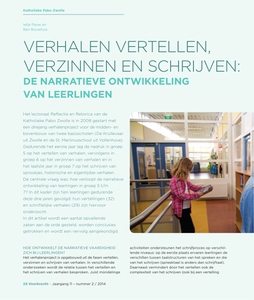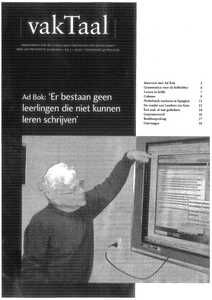In de bovenbouw havo en vwo werken leerlingen met het schrijfdossier aan hun schrijfvaardigheid, maar het zou jammer zijn als het schrijfdossier puur voor deze klassen voorbehouden is. Want ook in de onderbouw kunnen leerlingen goed en gestructureerd aan hun schrijfvaardigheid werken, ook met een schrijfdossier. Bas jongenelen zet in dit artikel een methode uiteen waarbij onderbouwleerlingen hun schrijfvaardigheid effectief kunnen verbeteren: de Metro-methode, waarbij de basis steeds gelijk is, maar in de uitvoering zeer gedifferentieerd gewerkt kan worden.
DOCUMENT

Hbo-studenten worden geacht hun schrijfvaardigheid te ontwikkelen gedurende hun studie. Uit onderzoek in de onderwijspraktijk blijkt de gewenste schrijfvaardigheidsontwikkeling van veel studenten echter tegen te vallen. Hierdoor presteren zij suboptimaal tijdens hun studie en erna. Binnen hbo-instellingen zijn het veelal de taaldocenten die verantwoordelijk worden gehouden voor dit probleem. In dit artikel staat de vraag centraal wat vakdocenten nodig hebben om te kunnen bijdragen aan de ontwikkeling van de vakspecifieke schrijfvaardigheid van hun studenten. Uitgaande van de theorie rondom het integreren van taal in vakonderwijs (taalgericht vakonderwijs) en genredidactiek als specifieke vorm daarvan, wordt aan de hand van een reconstructieve analyse van drie hbo-praktijkcasussen verhelderd wat vakdocenten nodig hebben om taal succesvol in hun onderwijs te integreren.
DOCUMENT
Het schrijven van een goede tekst is geen gemakkelijke opgave. Zeker niet als die tekst geschreven moet worden in een andere dan je eerste taal. Wellicht is dat de reden dat schrijfvaardigheid relatief weinig en laat aan bod komt in NT2-curricula. Maar is dat terecht? Dit artikel biedt een alternatief perspectief op schrijfonderwijs: schrijfonderwijs dat niet (alleen) als doel heeft leerders goede teksten te leren schrijven, maar dat schrijven vooral inzet als middel ten behoeve van taalvaardigheidsontwikkeling. Deze benadering wordt writing-to-learn genoemd en is voor leerders op elk niveau, in elke context zinvol. In deze bijdrage legt Catherine van Beuningen uit hoe schrijven het taalleerproces kan ondersteunen en hoe je writing-tolearn in de praktijk kunt vormgeven.
DOCUMENT
Tijdens het driejarig verhalenproject voor de midden- en bovenbouw van twee basisscholen was de centrale vraag: hoe verloopt de narratieve ontwikkeling van leerlingen in groep 5 t/m 7? Binnen het verhalenproject zijn de schriftelijke verhalen beduidend langer dan de vertellingen. Toch blijkt uit de inhoud dat het weergeven van een gebeurtenis, van personen, tijd en ruimte al zoveel van de schrijfkwaliteiten van de leerling vergt, dat het jezelf inleven in de lezer waardoor er meer aandacht is voor verrassende wendingen, verlevendiging van het verhaal, verdieping van karakters en het gebruik van verschillende tijds- en plaatsaanduidingen, voor velen een stap te ver is. Dit geldt ook voor het gebruik van specifieke taal binnen de context van het verhaal of de vertelling. Het modelgedrag van de leraren is in de lesbeschrijvingen steeds benadrukt, maar in de praktijk te weinig gemonitord. Ook het gericht geven van feedback op de verschillende genrekenmerken is te weinig structureel en op een verdiepende wijze onder de aandacht van de leerlingen gebracht. Want juist modeling en het geven van goede feedback door leraren en leerlingen kunnen de sleutels zijn voor het verbeteren van de schijfvaardigheid. Daarnaast kan er op het gebied van het reviseren van teksten (herschrijven) ook nog winst behaald worden.
DOCUMENT

Geen samenvatting beschikbaar
DOCUMENT
Veel eerstejaarsstudenten in het hoger onderwijs hebben moeite met schrijfvaardigheid in het Nederlands. Ze vinden het lastig om gestructureerde, lezergerichte teksten te schrijven in de meer abstracte en vakspecifieke taal van het hoger onderwijs. Deze moeilijkheden zijn problematisch omdat schrijven cruciaal is voor onderwijs en toetsing in de tertiaire context en ook in maatschappelijke zin een belangrijke rol vervult. In de laatste decennia hebben de schrijfproblemen van eerstejaarsstudenten veel aandacht gekregen. De aanpak die veel hogeronderwijsinstellingen hanteren is het aanbieden van vormgerichte, algemene schrijfcursussen in of naast het curriculum. Deze aanpak is ontoereikend gebleken. De ontwikkeling van schrijfvaardigheid vereist immers een vakspecifiek proces waarbij alle studenten en docenten betrokken zijn. Geïntegreerde aanpakken, waarbij het leren van vakinhoud en schrijfvaardigheid gecombineerd wordt, worden daarom verkozen boven de eerdergenoemde geïsoleerde aanpak.Genredidactiek als een vorm van geïntegreerd schrijfonderwijs lijkt in dat opzicht veelbelovend om de schrijfvaardigheid van studenten te bevorderen. De kern van genredidactiek is het expliciteren van hoe taal wordt gebruikt om specifieke communicatieve doelen te bereiken in verschillende contexten. Gegeven een gebrek aan onderzoek op dit terrein, gaat het huidige onderzoeksproject na hoe genredidactiek in het hoger onderwijs vormgegeven en ingezet kan worden. De hoofdvraag was:Hoe kan vakspecifieke genredidactiek in het hbo worden vormgegeven en ingezet met het oog op het bevorderen van de schrijfvaardigheid van eerstejaarsstudenten in vakspecifieke genres?Om deze vraag te beantwoorden, werden er drie deelvragen geformuleerd die de drie fases van ontwerpgericht onderwijsonderzoek reflecteren: a) voorbereiding en ontwerp, b) uitvoering, en c) evaluatie:a) Hoe kan vakspecifieke genredidactiek worden voorbereid en ontworpen?b) Hoe kan vakspecifieke genredidactiek worden ingezet?c) Welk effect heeft vakspecifieke genredidactiek op de schrijfvaardigheid van eerstejaarsstudenten in vakspecifieke genres?Context, theoretisch kader en onderzoeksaanpakHet onderzoek is gesitueerd tegen de achtergrond van taalbeleid Nederlands in het hoger onderwijs. De ontwikkeling en implementatie van breed taalbeleid wordt eerst geschetst in algemene zin en vervolgens in de onderzoekscontext van de Hospitality Business School (HBS) van Saxion in hoofdstuk 1. Vervolgens geeft hoofdstuk 2 inzicht in het theoretisch kader omtrent genredidactiek in dit onderzoek. Eerst wordt ingegaan op de eisen aan schrijfvaardigheid in het hoger onderwijs alsook op de huidige schrijfonderwijspraktijk. Vervolgens wordt gefocust op geïntegreerde aanpakken van schrijfonderwijs, die gestoeld zijn op content-based language instruction. De geïntegreerde aanpak van genredidactiek die centraal staat in dit onderzoek wordt gedetailleerd beschreven. Hierbij wordt eerst ingegaan op de historie. Ook worden de onderliggende functionele taaltheorie, socioculturele leertheorie en het bijbehorende concept van scaffolding beschreven. Scaffolding is een specifiek soort tijdelijke, responsieve hulp van een expert aan een leerder, die gericht is op het ontwikkelen van zelfstandigheid. Verder wordt de onderwijsleercyclus geïntroduceerd als een instructiekader binnen genredidactiek. Deze cyclus bestaat uit vier fases waarin een bepaald teksttype (genre) geïntroduceerd, gemodelleerd, samen geoefend en uiteindelijk individueel geschreven wordt door studenten. Hoofdstuk 2 sluit af met een overzicht van de voor- en nadelen van genredidactiek.De gekozen onderzoeksaanpak van ontwerpgericht onderwijsonderzoek wordt in hoofdstuk 3 besproken. Deze onderzoeksaanpak is aangewezen als een nieuwe onderwijsmethode tegelijkertijd wordt ontworpen
MULTIFILE

Interview met Ad Bok, de 'uitvinder' van TiO: Taalonderwijs in Ontwikkeling.
DOCUMENT

Heel wat mensen willen hun artikels gepubliceerd zien op de opiniepagina's van kranten, weekbladen of in tijdschriften. Zeker wetenschappers, (lokale) politici, studenten, bestuursleden van verenigingen of beginnende opiniemakers hebben vaak goede ideeën, maar ondervinden moeite om die overtuigend op papier te krijgen. Een publiek aanspreken, geboeid houden en overtuigen is immers een vak apart en wie de knepen ervan niet beheerst, verliest zijn lezers. Dit boek is gemaakt om mensen te helpen bij het schrijven van opinies. Stap voor stap leert het hoe men een publiek erbij houdt, hoe een verhaal opgebouwd wordt en welke structuur efficiënt werkt. Een beetje theorie schept inzicht, maar het boek is vooral een praktisch instrument dat elke schrijver, ook de geoefende, op weg helpt naar de opiniepagina.
DOCUMENT

Het begrip ‘mensenrechten’ wordt door veel mensen gebruikt. In het algemeen is het een uiting van een simpel basisidee: omdat we allemaal mens zijn hebben we recht op een minimum levensstandaard die ervoor kan zorgen dat we eens menswaardig bestaan leiden. En daar is eigenlijk iedereen wel voorstander van. En dat maakt het ook zo’n lastig begrip om te gebruiken: je kunt moeilijk ‘tegen’ mensenrechten zijn. Maar het gebruik van het begrip varieert sterk en kan zelfs tegenstrijdig zijn afhankelijk van de context. Het doel van deze whitepaper is dan ook om studenten meer begrip te geven over hoe het begrip ‘mensenrechten’ in verschillende contexten gebruikt wordt: een juridische context, een geopolitieke context en een bedrijfscontext.
LINK